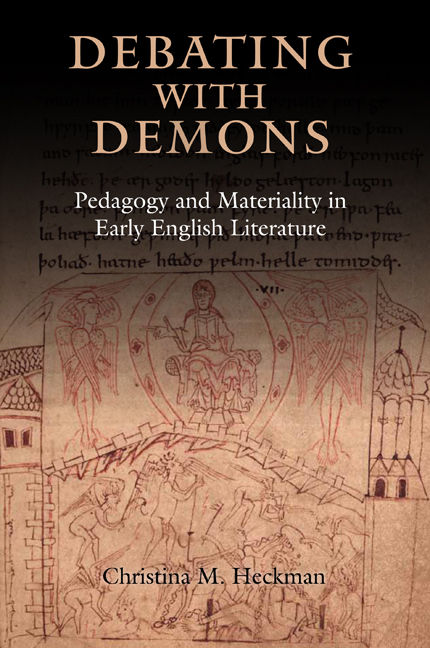Book contents
- Frotmatter
- Dedication
- Contents
- Introduction: The Devil’s Secret Chamber
- Part I Foundations
- 1 Spirituo-Materiality in the Early Middle Ages
- 2 The Artes Liberales in the Early Middle Ages
- 3 The Devil Within: Perils of Pedagogy in the Monastic School
- Part II The Demonic Magister in Early English Poetry
- 4 The Origin of the Teaching Demon: Lucifer as Magister
- 5 Demonic Teaching and the Fall in the Old English Genesis
- 6 Demonic Teaching and Saintly Discretio in Cynewulf’s Juliana
- 7 Inventing Materia: The True Cross and Saintly Disputation in Cynewulf’s Elene
- Conclusion: The Mysteries of Pedagogy
- Bibliography
- Index
- Acknowledgments
- Anglo-Saxon Studies
2 - The Artes Liberales in the Early Middle Ages
Published online by Cambridge University Press: 06 October 2020
- Frotmatter
- Dedication
- Contents
- Introduction: The Devil’s Secret Chamber
- Part I Foundations
- 1 Spirituo-Materiality in the Early Middle Ages
- 2 The Artes Liberales in the Early Middle Ages
- 3 The Devil Within: Perils of Pedagogy in the Monastic School
- Part II The Demonic Magister in Early English Poetry
- 4 The Origin of the Teaching Demon: Lucifer as Magister
- 5 Demonic Teaching and the Fall in the Old English Genesis
- 6 Demonic Teaching and Saintly Discretio in Cynewulf’s Juliana
- 7 Inventing Materia: The True Cross and Saintly Disputation in Cynewulf’s Elene
- Conclusion: The Mysteries of Pedagogy
- Bibliography
- Index
- Acknowledgments
- Anglo-Saxon Studies
Summary
If early English poetic devils deploy the verbal arts to debate with their ‘pupils,’ an understanding of how those arts were practiced in the early medieval period is fundamental. Research on the study of the artes liberales in the Carolingian Empire and early medieval England is ongoing. While the study of grammar by English scholars in this period has been thoroughly examined, much remains to be discovered about their knowledge and teaching of the two more ‘dangerous’ verbal arts: rhetoric, the art of persuasion, and dialectic, the logical art of argumentation. Although early English writers demonstrate awareness of rhetorical and dialectical theory, there is limited direct evidence of the widespread practice of Latin learning, including the study of dialectical and rhetorical treatises, in pre-conquest England. Existing studies of the verbal arts in early medieval England have tended to emphasize grammatica first and rhetorica second, focusing on Old English and Anglo-Latin written texts rather than the art of oral delivery. Both Carolingian and pre-conquest English writers, however, demonstrated significant interest in dialectic, especially in its applications to theological questions. This suggests that an understanding of dialectic provides an important foundation for the informal logic deployed in early English poetic debates, particularly those involving demons. Such debates required engaging with the liberal arts of grammar, rhetoric, and dialectic, all of which were inevitably associated with memory, violence, and place. In the early Middle Ages, some scholars did study and deploy the methods of dialectic, most prominently Alcuin, architect of Charlemagne's educational reform. These early dialectical experiments among the Carolingians have important implications for the study of the verbal arts in early medieval England.
The verbal arts: memory, violence, and place
The arts of rhetoric and dialectic are those deployed most often by early English poetic demons, who use these arts to establish magisterial authority and effect ontological change in their pupils. While crucial for educating preachers, philosophers, legal scholars, and theologians, the disciplines of rhetoric and dialectic were highly ambiguous due to their association with argument, persuasion, and therefore potential deception and manipulation. Pre-conquest scholars demonstrated significant interest in the account of the liberal arts of grammar, dialectic, and rhetoric in Books III–V of Martianus Capella's De nuptiis Philologiae et Mercurii (fifth century C.E.), extant in seven English copies from the ninth through the eleventh centuries.
- Type
- Chapter
- Information
- Debating with DemonsPedagogy and Materiality in Early English Literature, pp. 44 - 72Publisher: Boydell & BrewerPrint publication year: 2020



